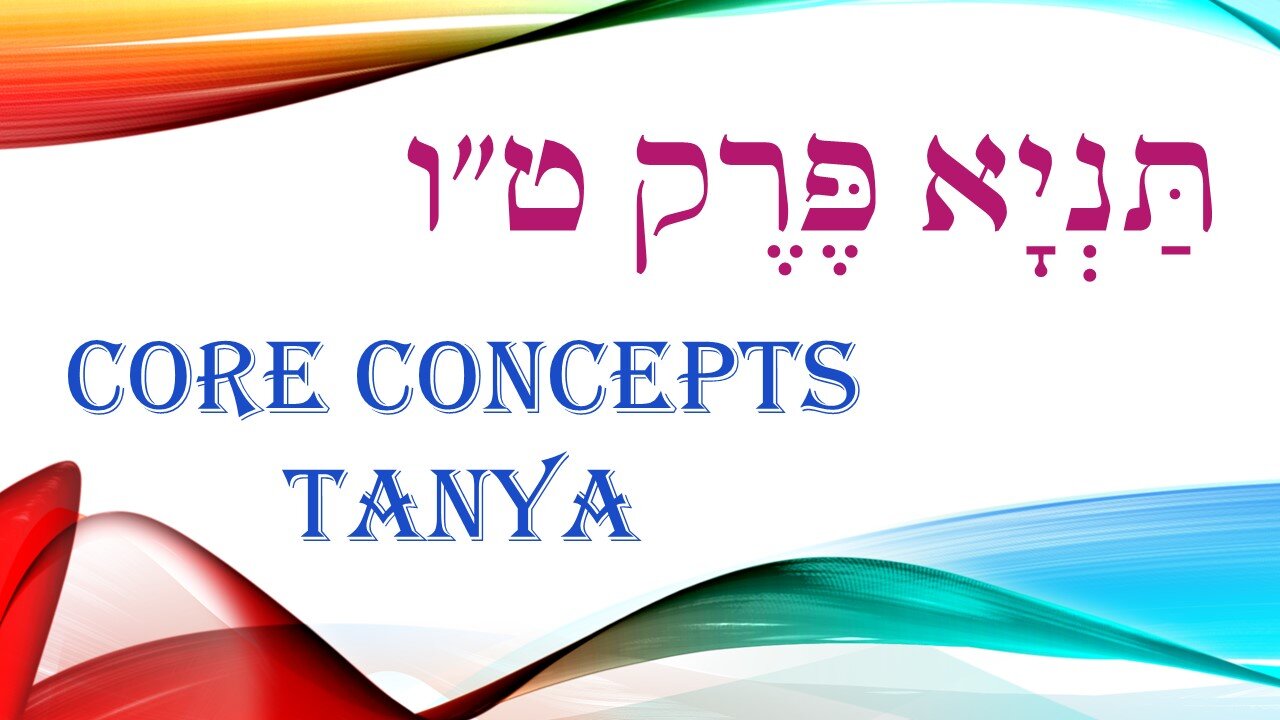Premium Only Content

Core Concepts Tanya: Chapter 15
Brief Recap of Chapter 15:
"True self" or better self?!
1. Chapter 15 starts off with a quote from the Prophet Malachi. "And you will return and see the difference between the righteous man and the wicked one, between he who serves G-d and he who serves Him not."
The second part of the quote seems to be another version of the first part, but the Alter Rebbe teaches that second part is speaking of two different levels of Beinoni.
2. There is a Beinoni who is considered "he who serves Him not,” as in, at the present moment he is not actively engaged in a battle over his desires/temptations.
He doesn't sin, but he's not a Tzaddik because he hasn’t fully conquered his animal soul.
Rather, he coasts along at a level that is natural to him.
For him, Torah and Mitzvot aren't a challenge.
For him, learning is a joy and staying away from promiscuous behavior is automatic.
For him, tapping into his innate love of G-d, an inheritance that every Jew has from our forefathers, is easy.
He does the right thing, he follows the right path because it's not a big deal for him.
3. "He who serves G-d" is a Beinoni that's at the level of "Oved Elokim," someone who is actively serving G-d in the present tense.
A Beinoni's service of G-d is an active, constant struggle between his inner desires/compulsions/temptations and his decision to do as he's supposed to.
A Tzaddik is called an "Eved Elokim," a servant of G-d, because he's made it, he's won the war.
The Beinoni battles day after day, so he's described as "serving" in the present tense.
4. For almost all of us, there is our natural state of being and our "nurtured" state of being.
This is the difference between doing what comes naturally to us, or that we’ve worked to make natural to us, and doing things that are beyond or against our nature.
Usually, we don't dedicate ourselves to something unless there's an element of love or fear attached to it.
Often love is the impetus for doing positive mitzvot and fear is the drive behind negative mitzvot.
In this regard, if a person wants to commit themselves toward making something second nature, then they need some sort of feeling toward it.
For us, for the Beinoni, we do that through meditating/focusing on G-d's greatness.
The more we do that, the more we awaken our innate love and cultivate our desire to do His will.
6. The one who "serves G-d," is someone who pushes past his natural state to a level beyond what he's used to.
An example in the Gemara is of donkey drivers. They charged one zuz for 10 parsa, but two zuz for 11.
Also, back in the day, students would review their studies 100 times to make sure they remembered them well.
Students who wanted to go beyond that reviewed 101 times.
This was a push against their natural state of being, and in this way they could change their nature.
Really, what's the difference between 100 and 101? 1.
But what's the difference on a personal level? Everything.
-
 LIVE
LIVE
TimcastIRL
1 hour agoTrump To SHUTTER 120 IRS Offices In MASS PURGE, Democrat LEAKED Tax Info w/Mike Crispi | Timcast IRL
15,005 watching -
 LIVE
LIVE
Kim Iversen
1 hour ago💰 CHA-CHING! 💰 Trump Unveils Big Money Plans For Gaza AND America
1,454 watching -
 2:00:20
2:00:20
Glenn Greenwald
6 hours agoThe View from Moscow: Key Russian Analyst Aleksandr Dugin on Trump, Ukraine, Russia, and Globalism | SYSTEM UPDATE #414
36.1K10 -
 1:10:55
1:10:55
Donald Trump Jr.
3 hours agoBREAKING NEWS: My Father Revokes Biden-Maduro Oil License, LIVE with Maria Corina Machado | Triggered Ep.220
109K125 -
 LIVE
LIVE
The Jimmy Dore Show
3 hours agoTrump AG Pam Bondi WON’T Release Epstein List! Corp Media ABANDONS Greta Thunberg! w/ Chris Hedges
13,802 watching -
 1:25:29
1:25:29
Sarah Westall
2 hours agoX-Files True History, Project Blue Beam, Cabal Faction War w/ Former FBI Agent John DeSouza
13.3K2 -
 7:03:49
7:03:49
Dr Disrespect
9 hours ago🔴LIVE - DR DISRESPECT - NEW PC VS. DELTA FORCE - MAX SETTINGS
120K25 -
 49:04
49:04
Lights, Camera, Barstool
1 day agoIs The Monkey The Worst Movie Of The Year?? + Amazon Gets Bond
31.2K2 -
 24:19
24:19
Adam Carolla
21 hours agoDiddy’s Legal Drama Escalates, Smuggler Caught Hiding WHAT? + Philly Eagles & The White House #news
40.7K5 -
 10:12
10:12
Mike Rowe
2 days agoClint Hill: What A Man. What A Life. | The Way I Heard It with Mike Rowe
43.7K6